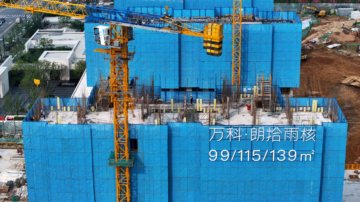【新唐人2012年8月25日讯】最近,大陆房市一扫持续低迷的惨澹状态,高档楼盘出现春寒乍暖,拉高均价的现象,专家认为,促成这个现象的原因,其中不乏民间没有其他投资管道,和对大陆整体经济缺乏信心等。对于未来房市走势的观察,各方专家学者看法不一。各方更关注的是,中共当局是否将出台新的楼市调控政策。
根据中共国家统计局19号最新资料显示,7月份内地70个大中城市当中,有50个城市的新建商品住宅环比价格上涨。今年元月,各个城市的环比价格还处于0上涨,但到了7月,环比价格上涨增长了一倍,这份资料令人关注。
经济学家茅于轼分析,近期房价上涨的原因,一个是大陆百姓贫富差距过大,富人买好几套房,而穷人一套也买不起的收入分配问题。另外,对于富人来说,没有其他投资的管道。
经济专家茅于轼:“能赚钱的项目都被国家占了,老百姓只好买房﹔还有房价高是因为地价高,地价高的原因就是土地被政府垄断了,没有竞争地价当然就高﹔还有过去4万亿的投入,还有货币促进了房价高。这些原因现在都没有变化,所以房价还是要高的。”
纽约市立大学经济学教授陈志飞认为,另一个促使大陆房市目前上涨的原因是,大众对中国的股市和其他投资项目失去信心。
纽约市立大学经济学教授陈志飞:“今年以来中国的股市也是一再下跌,股民纷纷撤资﹔现在热钱也往外走。在这种情况下,大众没有办法,只好把钱投在房地产。”
据报导,7月下旬到8月上旬,中共国务院派出8个督查组,就中央楼市调控政策,对包括北京、天津、上海、重庆、广东等16个省市进行检查。初步结论是“市场不具备全面反弹的条件”、“不必再出台调控新政策”。
陈志飞分析,目前大陆“制造业采购经理指数”PMI下降到48.7,偏离50的情况观察,中国的制造业持续萎缩,相应而生的就业人口必然下降。他认为,虽然,目前不会再次发生像08年之后,大陆2千万工人被迫还乡的危机,但就业前景的黯淡,也促使楼市缺乏充分的需求,来造成实质性的上扬迹象。
陈志飞:“而且,大家现在也是比较小心,也就是说,中国投资环境已经很恶化了﹔所以,楼市不可能回覆到火爆的样子﹔所以就不会再出台新的政策。从它(国务院)的估计来看,它实际上是知道这是一个宽松政策造成的,并不是真正的需求的值的变化,或者是经济活动有明显的改善。”
另外,住房城乡建设部有关负责人最近接受媒体采访时介绍,全国重点城市可售新建商品住房面积仍处于历史高位。这两、三个月以来,由于大量新楼盘陆续上市,商业银行连续下调购房贷款利率,并下调首购贷款利率。有个别城市出现为保增长,透过放松住房限购条件及发放购房补贴等方式来刺激买房。
由于大陆各地财政收入有60%缴给中共中央,各地财政是靠卖地维持支出。经济评论家草庵居士认为,中央持续出台打房政策,显然造成地方的各项建设资金被截断、财政开支短缺。
经济评论家草庵居士:“所以这就造成一个很严重的问题,中央跟地方就有一个矛盾。尽管,中央很清楚知道,房地产泡沫走向于极端就会崩盘,造成很大经济危机,它想办法打压。但是地方政府出于地方利益,就不得不想办法去跟中央对抗,还要维持房地产(上扬)。其实我们看到的本质就是,地方跟中央政府在博奕。”
目前,中央当局持续1年多的房市调控,是否随着各地房价上涨,未来进一步强化市场调控政策,也成为各方的关注焦点。
采访编辑/梁欣 后制/王明宇
China's Property Market Bounces
China's high-end property market
has recently began to recover.
Experts have attributed this to lack of other investment channels,
and loss of public confidence in the Chinese economy.
Opinions differ on how China's housing
market will go in the near future.
The spotlight is now focused on whether the Chinese
Communist Party (CCP) will implement new policies for regulation of the real estate market.
On August 19, latest official data shows a month-to-month
rise in new-home sales in China's 50 major cities.
The figure was zero in January this year, while it has
doubled in July. The data has caused public concern.
Economist Mao Yushi analyzed
the reasons for a rise in house prices.
One is due to the widening of the rich-poor gap.
The rich could own multiple properties,
while the poor cannot afford even one.
The other is that the rich have no other investment channels.
Mao Yushi: "All lucrative projects
have been controlled by the regime.
The civilians have no other options but to invest in property.
High land prices have caused soaring house prices.
Land is monopolized by the government,
so its prices should certainly be high.
In the past, the government invested 4-Trillion
Yuan to stimulate the economy and the Chinese Monetary Policy has caused house price rises.
All these factors remained unchanged,
so the housing prices still stay high."
Chen Zhifei, professor of economics at City University,
New York, reveals another reason.
That is, the public has lost confidence in China's
stock market, as well as other investment projects.
Chen Zhifei: "China has seen an ongoing
decline in the stock market this year.
Stock investors have beaten a path to withdraw their money.
Now, hot money is flowing away from the stock market.
In this case, the public has no other
choice, but to invest in property.”
Media have reported that between late July and early August,
the CCP State Council sent out eight groups to inspect
the application of Central policies on real estate regulation.
The inspections were conducted in 16 provinces and cities,
including Beijing, Tianjin, Shanghai, Chongqing, Guangdong.
The preliminary conclusion was that "in the market,
there do not exist conditions to allow it to fully bounce".
It also concluded that "it's unnecessary
to introduce new regulatory policy.”
Chen Zhifei says that China's PMI data has dropped to 48.7.
When this figure is lower than 50, it indicates
that manufacturing will continue to shrink.
This leads to more jobless population.
Chen forecasts that China will not see a crisis of massive
jobless migrant workers' returning home like that in 2008.
However, the bleak unemployment
contributed to a lack of housing demand.
Chen Zhifei analyzed that in reality,
this led to soaring real estate prices.
Chen Zhifei: "Now the public is very cautious,
as China's investment environment has worsened.
The property market will not bounce
back to what it was during it's peak.
That's why no new polices are expected to be seen.
The State Council's move showed that it has actually
known the situation was caused by an easing policy.
The regime knows that it wasn't a result of a real change
in demand, or of significant economic improvement."
The CCP Housing and Urban Construction Ministry
official commented during a recent media interview.
In China's major cities, the amount of new
commercial housing for sale is still historically high.
The past few months have witnessed
a great supply of new commercial houses.
Banks have successively cut housing loan interest rates.
Banks have also lowered mortgage
interest rates for first-time home buyers.
In order to maintain economic growth to boost property
sales, some cities have loosened house purchasing restrictions and allocated housing subsidies.
The CCP central authorities collect
60% of local fiscal revenues.
Land sales are the main source of local finance.
Economic commentator Cao'an comments that
the central policies on restricting housing sales
have apparently cut the sources of funds for local
construction projects and fiscal revenue.
Cao'an: "This has created a very serious problem.
A conflict exists between Central authorities and the local's.
The Central authorities clearly knows the property
bubble will collapse if it runs to the extreme,
and will lead to a great economic crisis.
It tries every means to cool the property market.
But local authorities, acting out of local interests, have
managed to confront Central policy and boost real estate.
In essence, local authorities are
contending with central authorities."
Facing nationwide rising house prices in China,
will the CCP regime further tighten its existing housing market regulation policy?
This question has become the focus of public attention.
根据中共国家统计局19号最新资料显示,7月份内地70个大中城市当中,有50个城市的新建商品住宅环比价格上涨。今年元月,各个城市的环比价格还处于0上涨,但到了7月,环比价格上涨增长了一倍,这份资料令人关注。
经济学家茅于轼分析,近期房价上涨的原因,一个是大陆百姓贫富差距过大,富人买好几套房,而穷人一套也买不起的收入分配问题。另外,对于富人来说,没有其他投资的管道。
经济专家茅于轼:“能赚钱的项目都被国家占了,老百姓只好买房﹔还有房价高是因为地价高,地价高的原因就是土地被政府垄断了,没有竞争地价当然就高﹔还有过去4万亿的投入,还有货币促进了房价高。这些原因现在都没有变化,所以房价还是要高的。”
纽约市立大学经济学教授陈志飞认为,另一个促使大陆房市目前上涨的原因是,大众对中国的股市和其他投资项目失去信心。
纽约市立大学经济学教授陈志飞:“今年以来中国的股市也是一再下跌,股民纷纷撤资﹔现在热钱也往外走。在这种情况下,大众没有办法,只好把钱投在房地产。”
据报导,7月下旬到8月上旬,中共国务院派出8个督查组,就中央楼市调控政策,对包括北京、天津、上海、重庆、广东等16个省市进行检查。初步结论是“市场不具备全面反弹的条件”、“不必再出台调控新政策”。
陈志飞分析,目前大陆“制造业采购经理指数”PMI下降到48.7,偏离50的情况观察,中国的制造业持续萎缩,相应而生的就业人口必然下降。他认为,虽然,目前不会再次发生像08年之后,大陆2千万工人被迫还乡的危机,但就业前景的黯淡,也促使楼市缺乏充分的需求,来造成实质性的上扬迹象。
陈志飞:“而且,大家现在也是比较小心,也就是说,中国投资环境已经很恶化了﹔所以,楼市不可能回覆到火爆的样子﹔所以就不会再出台新的政策。从它(国务院)的估计来看,它实际上是知道这是一个宽松政策造成的,并不是真正的需求的值的变化,或者是经济活动有明显的改善。”
另外,住房城乡建设部有关负责人最近接受媒体采访时介绍,全国重点城市可售新建商品住房面积仍处于历史高位。这两、三个月以来,由于大量新楼盘陆续上市,商业银行连续下调购房贷款利率,并下调首购贷款利率。有个别城市出现为保增长,透过放松住房限购条件及发放购房补贴等方式来刺激买房。
由于大陆各地财政收入有60%缴给中共中央,各地财政是靠卖地维持支出。经济评论家草庵居士认为,中央持续出台打房政策,显然造成地方的各项建设资金被截断、财政开支短缺。
经济评论家草庵居士:“所以这就造成一个很严重的问题,中央跟地方就有一个矛盾。尽管,中央很清楚知道,房地产泡沫走向于极端就会崩盘,造成很大经济危机,它想办法打压。但是地方政府出于地方利益,就不得不想办法去跟中央对抗,还要维持房地产(上扬)。其实我们看到的本质就是,地方跟中央政府在博奕。”
目前,中央当局持续1年多的房市调控,是否随着各地房价上涨,未来进一步强化市场调控政策,也成为各方的关注焦点。
采访编辑/梁欣 后制/王明宇
China's Property Market Bounces
China's high-end property market
has recently began to recover.
Experts have attributed this to lack of other investment channels,
and loss of public confidence in the Chinese economy.
Opinions differ on how China's housing
market will go in the near future.
The spotlight is now focused on whether the Chinese
Communist Party (CCP) will implement new policies for regulation of the real estate market.
On August 19, latest official data shows a month-to-month
rise in new-home sales in China's 50 major cities.
The figure was zero in January this year, while it has
doubled in July. The data has caused public concern.
Economist Mao Yushi analyzed
the reasons for a rise in house prices.
One is due to the widening of the rich-poor gap.
The rich could own multiple properties,
while the poor cannot afford even one.
The other is that the rich have no other investment channels.
Mao Yushi: "All lucrative projects
have been controlled by the regime.
The civilians have no other options but to invest in property.
High land prices have caused soaring house prices.
Land is monopolized by the government,
so its prices should certainly be high.
In the past, the government invested 4-Trillion
Yuan to stimulate the economy and the Chinese Monetary Policy has caused house price rises.
All these factors remained unchanged,
so the housing prices still stay high."
Chen Zhifei, professor of economics at City University,
New York, reveals another reason.
That is, the public has lost confidence in China's
stock market, as well as other investment projects.
Chen Zhifei: "China has seen an ongoing
decline in the stock market this year.
Stock investors have beaten a path to withdraw their money.
Now, hot money is flowing away from the stock market.
In this case, the public has no other
choice, but to invest in property.”
Media have reported that between late July and early August,
the CCP State Council sent out eight groups to inspect
the application of Central policies on real estate regulation.
The inspections were conducted in 16 provinces and cities,
including Beijing, Tianjin, Shanghai, Chongqing, Guangdong.
The preliminary conclusion was that "in the market,
there do not exist conditions to allow it to fully bounce".
It also concluded that "it's unnecessary
to introduce new regulatory policy.”
Chen Zhifei says that China's PMI data has dropped to 48.7.
When this figure is lower than 50, it indicates
that manufacturing will continue to shrink.
This leads to more jobless population.
Chen forecasts that China will not see a crisis of massive
jobless migrant workers' returning home like that in 2008.
However, the bleak unemployment
contributed to a lack of housing demand.
Chen Zhifei analyzed that in reality,
this led to soaring real estate prices.
Chen Zhifei: "Now the public is very cautious,
as China's investment environment has worsened.
The property market will not bounce
back to what it was during it's peak.
That's why no new polices are expected to be seen.
The State Council's move showed that it has actually
known the situation was caused by an easing policy.
The regime knows that it wasn't a result of a real change
in demand, or of significant economic improvement."
The CCP Housing and Urban Construction Ministry
official commented during a recent media interview.
In China's major cities, the amount of new
commercial housing for sale is still historically high.
The past few months have witnessed
a great supply of new commercial houses.
Banks have successively cut housing loan interest rates.
Banks have also lowered mortgage
interest rates for first-time home buyers.
In order to maintain economic growth to boost property
sales, some cities have loosened house purchasing restrictions and allocated housing subsidies.
The CCP central authorities collect
60% of local fiscal revenues.
Land sales are the main source of local finance.
Economic commentator Cao'an comments that
the central policies on restricting housing sales
have apparently cut the sources of funds for local
construction projects and fiscal revenue.
Cao'an: "This has created a very serious problem.
A conflict exists between Central authorities and the local's.
The Central authorities clearly knows the property
bubble will collapse if it runs to the extreme,
and will lead to a great economic crisis.
It tries every means to cool the property market.
But local authorities, acting out of local interests, have
managed to confront Central policy and boost real estate.
In essence, local authorities are
contending with central authorities."
Facing nationwide rising house prices in China,
will the CCP regime further tighten its existing housing market regulation policy?
This question has become the focus of public attention.








